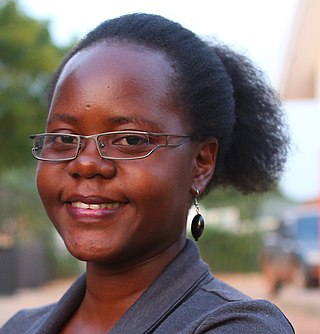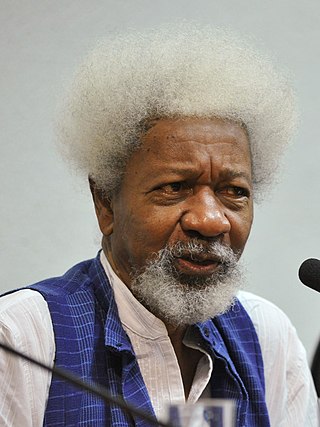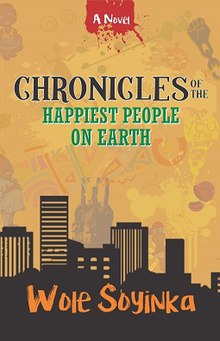
Akinwande Oluwole Babatunde Soyinka Hon. FRSL, known as Wole Soyinka, is a Nigerian playwright, novelist, poet, and essayist in the English language. He was awarded the 1986 Nobel Prize in Literature for his "wide cultural perspective and... poetic overtones fashioning the drama of existence", the first sub-Saharan African to be honoured in that category.

Sir Ben Golden Emuobowho Okri is a Nigerian-born British poet and novelist. Considered one of the foremost African authors in the postmodern and post-colonial traditions, Okri has been compared favourably to authors such as Salman Rushdie and Gabriel García Márquez. In 1991, his novel The Famished Road won the Booker Prize. Okri was knighted at the 2023 Birthday Honours for services to literature.

Nigerian literature may be roughly defined as the literary writing by citizens of the nation of Nigeria for Nigerian readers, addressing Nigerian issues. This encompasses writers in a number of languages, including not only English but Igbo, Urhobo, Yoruba, and in the northern part of the county Hausa and Nupe. More broadly, it includes British Nigerians, Nigerian Americans and other members of the African diaspora.
African literature is literature from Africa, either oral ("orature") or written in African and Afro-Asiatic languages. Examples of pre-colonial African literature can be traced back to at least the fourth century AD. The best-known is the Kebra Negast, or "Book of Kings" from the 14th century AD. Another well-known book is the Garima Gospels, one of the oldest known surviving bibles in the world, written in Ge'ez around 500 AD.
Abiku is a Yoruba word that can be translated as "predestined to death". It is from (abi) "that which was born" and (iku) "death".
Tanure Ojaide is a Nigerian poet and academic. As a writer, he is noted for his unique stylistic vision and for his intense criticism of imperialism, religion, and other issues. He is regarded as a socio-political and an ecocentric poet. He won the 2018 Wole Soyinka Prize for Literature in Africa with his collection Songs of Myself: A Quartet (2017).
Wole Soyinka Prize for Literature in Africa is a pan-African writing prize awarded biennially to the best literary work produced by an African. It was established by the Lumina Foundation in 2005 in honour of Africa's first Nobel Laureate in Literature, Wole Soyinka, who presents the prize, which is chosen by an international jury of literary figures. Administered by the Lumina Foundation, the prize has been described as "the African equivalent of the Nobel Prize".

Kongi's Harvest is a 1970s Nigerian drama film directed by Ossie Davis. The film was adapted from a screenplay by Wole Soyinka adapted from his 1965 play of the same name. Soyinka, a Nigerian playwright, poet, and the first African to be awarded the Nobel Prize in Literature in 1986, also starred in the leading role as the dictator of an African nation.

Ber Anena born and previously published as Harriet Anena is a Ugandan writer and performer, whose writing includes poetry, nonfiction and fiction. She is the author of a collection of poems, A Nation In Labour, published in 2015, won the 2018 Wole Soyinka Prize for Literature in Africa. The Economist described her poetry performance as "an arresting evocation of love and war".
Tunji Oyelana is a multi-award-winning Nigerian musician, actor, folk singer, composer and once a lecturer at the University of Ibadan, Nigeria. Tunji Oyelana is of the Yoruba ethnic group and is a native of Nigeria. Most of Tunji Oyelana's songs are in Yoruba. In the early 1980s, he teamed up with Nigeria's first and only winner of the Nobel Prize for Literature, Wole Soyinka, to record a musical album that satirized the corruption of the Nigerian political elite. He was the musician for Stéphane Breton's 1994 film Un dieu au bord de la route. Oyelana is credited with having sold the most albums by a Nigerian High Life musicians. In 2012 he released A Nigerian Retrospective 1966-79, an album from Soundway Records. Apart from Fela Kuti and King Sunny Ade, Oyelana is regarded as one of the most played Yoruba musicians. He and Soyinka composed I Love My Country and, in 1996, were both charged with treason and forced into exile by Sani Abacha while touring internationally with Soyinka's play The Beatification of Area Boy. Oyelana, the leader of The Benders currently lives in the United Kingdom.

Season of Anomy is the second novel by Nobel winning Nigerian playwright and critic Wole Soyinka. Published in 1973, it is one of only three novels published during Soyinka's highly productive literary career. Though highly studied as part of Soyinka's importance to the African literary canon, criticism of the novel has been mixed, with some critics describing the novel as a "failure".
Ripples Nigeria is a Nigerian online newspaper based in Lagos. It was launched in 2015. It is an independent, pro-investigation multi-media online news platform focused primarily on politics, policy and economy.
Ivor Agyeman-Duah is a Ghanaian academic, economist, writer, editor and film director. He has worked in Ghana's diplomatic service and has served as an advisor on development policy.

Glory is the second novel of Zimbabwean author NoViolet Bulawayo. Published on 8 March 2022, Glory is a political satire inspired by George Orwell's novel Animal Farm. It was shortlisted for the 2022 Booker Prize, which was announced on September 6, 2022.

The 1986 Nobel Prize in Literature was awarded to the Nigerian writer Wole Soyinka "who in a wide cultural perspective and with poetic overtones fashions the drama of existence." He is the first African recipient of the prize.
Elesin Oba, The King's Horseman is a 2022 Yoruba-language Nigerian historical drama film directed by Biyi Bandele and distributed by Netflix, based on Wole Soyinka'sDeath and the King's Horseman, a stage play he wrote while in Cambridge, where he was a fellow at Churchill College during his political exile from Nigeria, and it is based on a real incident that took place in Yorubaland during British Colonial rule. The film stars Odunlade Adekola as the titular character, with Shaffy Bello, Brymo, Deyemi Okanlawon, Omowunmi Dada, Jide Kosoko, Langley Kirkwood, Joke Silva amongst others in supporting roles.

Of Africa is a book written by Wole Soyinka, a Nigerian playwright, novelist, poet, and essayist who is also the author of The Bacchae of Euripides (1969), Season of Anomy amongst others. The book was centered on Africa's culture, religion, history, imagination, and identity, examining how its past intertwines with that of others. He emphasizes Africa's intrinsic values, including its humanity, self-worth, and methods of environmental stewardship, encompassing both physical and intangible aspects. Despite acknowledging Africa's daunting challenges, Soyinka rejects defeatism, eloquently analyzing issues from historical significance to the rise of theocracy. He confronts complex topics like racial biases, inter-ethnic conflicts, and the impact of colonial-imposed borders on nationhood. Soyinka's examination reimagines Africa's place in the reader's mind, charting a path toward a future defined by peace and self-empowerment.
Alapata Apata, a satirical play by Wole Soyinka mocking Nigerian politics through the story of Alaba, a retired butcher. As Alaba adjusts to his newfound leisure, the play exposes the absurdities of power dynamics and political manipulation in Nigeria. With humor and wit, Soyinka critiques corruption and hypocrisy, offering a sharp commentary on governance while entertaining readers with its humorous portrayal of characters and situations.

King Baabu is a play by Wole Soyinka amongst his others plays including The Lion and the Jewel,A Dance of the Forests, and The Strong Breed. Wole Soyinka was the first African to win the Nobel Prize award in 1986. King Baabu is a satirical play that mirrors the rule of General Abacha in Nigeria through absurdity and humor. It follows the transformation of General Basha Bash into King Baabu, portraying his reign with a cast of characters speaking in a childish language. Through comedy and storytelling, the play critiques power, corruption, and the cult of personality, leaving a lasting impression as a poignant commentary on political absurdity.
Climate of fear is a literary work by Wole Soyinka, a Nigerian playwright, novelist, poet, and essayist who is also the author of The Bacchae of Euripides (1969), Season of Anomy amongst other works. Through this non-fiction Soyinka addresses the way fear affects individuals in different ways, how fear is used in controlling people.











